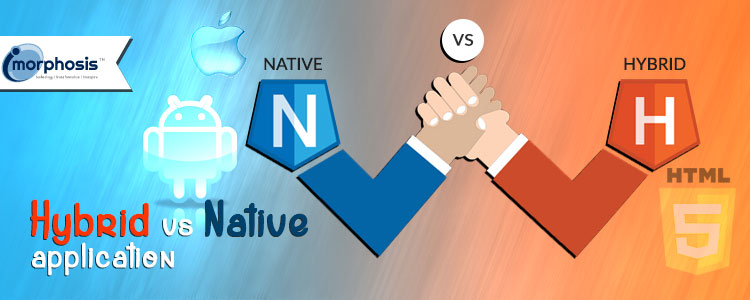Name a thing and you will get a mobile app for it! Does this sound to be a joke, No. It is true, just try typing a keyword, and you will find a relevant mobile application in the app stores. Startups, corporate businesses, across all sectors have realized the importance of mobile apps. But the question is where to start? The first dilemma faced by a majority of the businesses is hybrid vs native app.
Whether a Hybrid or a Native app, the choice is not simple for any business. First, they need to understand the difference between native and hybrid app and then identify which one will fit your project requirement. Few important determinants for a business while deciding on the type of mobile app and development methodology- behavior and habit of the target audience, performance, type of device to be used, security, scalability and budget. Of these, the first one being the most important factor, to understand how the audience interacts with a mobile application.
Why Hybrid vs Native app
Over the years, there have been many discussions and debates on hybrid vs native app. Both have its unique advantages and disadvantages.
What is hybrid app?
It is a web application in a native app shell. Hybrid applications are cross-platform and does not require different versions for iOS and Android. These mobile applications are developed with HTML5, JavaScript and CSS. Platforms like Cordova, Xamarin and Appcelerator Titanium enable hybrid mobile app development. Developers use Software Development Kit (SDK) to deploy the hybrid mobile app in different operating systems and platforms.
Advantages of Hybrid App
In the year 2016, Gartner predicted that over 50 percent mobile apps will be developed with a hybrid approach. Hybrid app development seems to be profitable for the businesses, as they do not have to separate developer for each mobile platform. It is a cheap and fast solution as you can develop a mobile app for both mobile platforms at the same time.
Development process – The development process is simple, which makes the speed to market fast.
Maintenance – Since the developers have to deal with a single codebase rather than multiple ones as in the case of native apps, maintenance is very easy.
Low Cost – Best part is that you do not have to develop mobile apps for two different mobile platforms.
Minimum requirement – Just one language is required for developing mobile apps that will be compatible for all the platforms. Thus, developers need not learn languages specific to the respective mobile platforms.
The downside- User experience is a major concern in hybrid mobile apps. Developers do not have access to built-in capability like camera, calendar, GPS and more, of the mobile device in hybrid methodology. Since the app can adapt to different operating system, users can feel the difference in interaction with the mobile app.
What is native app?
Smartphone and tablet applications that are developed for a particular mobile operating system or platform. For the Native apps developers use Objective-C or Swift for iOS and Java for Android. These apps are developed in a mature ecosystem for a particular mobile operating system and following the specific user experience and technical guidelines.
Advantages of Native App
Owing to development methodology, Native apps provide better user experience, fast experience and improved in-built functionalities.
Performance – Since the native mobile app is developed for a particular mobile operational system, these are fast and have better performance in comparison to the hybrid apps. This makes the native mobile applications perfect for games.
User Experience – Be it mobile apps for iOS or Android, each has its individual characteristic, that users feel natural. Long-time users of any mobile platform will not face any difficulty in handling the app as it follows the specific UI standards.
Built-in capability – Native apps can seamlessly access the built-in capability of the mobile devices. As a result, native applications can access GPS, calendar, camera and microphone easily than the hybrid apps.
Internet connection – Internet connection is not required by the native applications to work.
Audience – Users can find the apps easily in the respective App stores. So, businesses can reach out to their target audience easily.
The downside- There are a few drawbacks of native apps as well. Native app development is difficult as developers have to be proficient in the particular mobile language. Since platform specific code is written for developing these mobile applications, developers need to use different API process and language for Android and iOS. Native app development increases the time of development and boosts the cost involved.
Source – joshmorony.com
Factors deciding the winner
It is hard to brand a particular type of mobile app the winner in the debate hybrid vs native app. For users, the methodology for mobile app development is not of utmost importance, there are other factors that count.
User Experience – User experience matters the most! It is the key to the success of any mobile application and the most critical differentiator. The process of mobile app development now revolves around user experience. User experience comprises of navigation, layout, color, typography, animation, modal structure and interactivity.
Developers need to understand the psyche of the users. It is simple- once a user is accustomed to their device, chances of using new features are very slim unless it is too intriguing.
Statistics show that almost 92 percent customers have a negative reaction towards app like switching to a similar app by the competitor, give poor rating or uninstalling it. Almost 79 percent users would try a mobile app once, in case the app fails the first time. A meager 16 percent users would try a mobile app more than twice. These numbers explain the importance of user experience.
Native app is a better option when it comes to user experience. In a hybrid app, even if it has the best user experience, often it cannot cater to two different mobile platforms. The guidelines for each mobile operating system is different, so the user experience of one platform might be different from that of another.
App Performance – Mobile app performance is yet another determinant. It is defined by user perception as how the application works and measured by the responsiveness, load time, use of device memory, frame rate and how smooth is the animation. As per a report by experts, almost 84 percent of users consider mobile app performance as an important factor. For instance, Walmart evidenced an increase of almost 2 percent in conversion rate with improvement in load time by 1 second.
Now, when it comes to hybrid vs native app, in terms of performance, native mobile app is the winner. Even experts agree that hybrid apps take a back seat when it comes to app performance.
Native app loads faster, users can navigate the content and visual elements seamlessly and these enhance their user experience. On the contrary, when a user downloads a hybrid app to their device, the app has only wrapper and the data is fetched from the server. Two factors that might impact the app performance in case of hybrid apps are- server request numbers and load balance request.
Release Cycle – For mobile apps, release cycle matters. Now the release cycles are short. In hybrid apps, users need not update their app on the app store. When the mobile app company releases new features, the app is updated automatically and it results in a remarkable change in user experience.
On the other hand, users of native applications have to update their apps to enjoy the change. Regular mobile app updates is not effective for every user. Frequent updates may also lead a user to uninstall the mobile app, which is not desirable.
Budget and Timeline – While developing a mobile application, you simply cannot turn a blind eye to budget and timeline. Both go hand in hand and are important factors for any business. If budget is not a constraint and you are not bound by any stringent timeline, then opt for native mobile app development. Cost of hybrid mobile development is low in comparison to native development, which is quite expensive.
A word of caution for the developers and businesses, first calculate the resources you are exhausting to develop the app and then make the necessary changes. Worth mentioning instance, in this regard is Facebook. The social titan in 2012 decided on developing html5 app initially, but when it did not perform well, they changed their strategy and went native.
The bottom line is there is no one-size-fit-all approach for mobile app development or answer to the discussion hybrid vs native app as there are different factors involved. Now, developers tailor-make their approach as per the particular environment. However, for testing new ideas, hybrid app is great.
Source : Telerik.com
Concluding the debate hybrid vs native app
Once you have understood the pros and cons of each mobile app, it will be easy to decide on the methodology. However, for the perusal of businesses and developers there are a few questions that you can ask. The answers to the following questions will clear your doubts about hybrid vs native app and help you to decide which will meet your business need.
- Do you need native features for your mobile apps?
- Does user experience play an important role for your mobile app?
- How fast you want the app to hit the market?
- Have you allocated a separate budget for Android and iOS development?
- How often do you intend to update the mobile app?
The decision regarding hybrid vs native app should always depend on the current business need as well as the future plans. So, you need to decide on any particular platform, only after thorough analysis of each platform.





